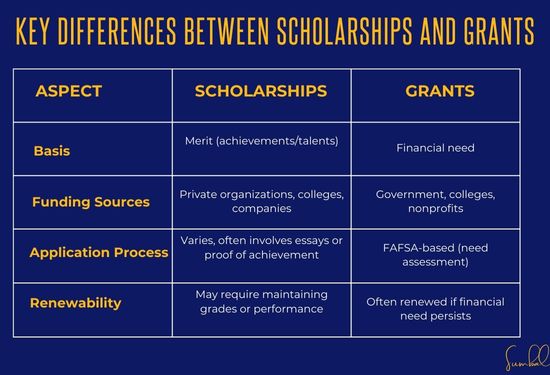The price of obtaining higher education seems unattainably high. Scholarships and grants are very important sources of funds since they are forms of funds without repayment. Even though the terms “scholarships” and “grants” sound quite similar, they are different types of financial aid. Learning differences and how to use them to the fullest can also greatly affect students' perceptions of college costs.

Scholarships
Scholarships are incentives for learners to improve their performance and abilities in a given field. Educational institutions, private entities, corporate institutions, or non-profit organizations can offer these awards.
Types of Scholarships
- Academic Scholarships: These are given due to high grades, satisfactory test scores, or other performance results in academic endeavors.
- Athletic Scholarships: Awarded to learners who perform extraordinarily in various games and agree to represent a school team.
- Artistic Scholarships: These scholarships are for musicals, plays, paintings, sculptures, and any other creativity in this social institution.
- Diversity Scholarships: These scholarships support people with limited access to services, including diverse minorities.
- Need-Based Scholarships: Besides merit, there is a need to include financial need at some level.
Application Process
Applying for scholarships entails writing essays, recommendations, transcripts, or portfolios based on the type of scholarship. Scholarship specifications vary regarding required application details and time-restriction dates that one must meet or exceed.

Grants
Grants are financial awards given to students based on their personal needs. They are meant for students who cannot afford tuition and other costs. Most are supported through grants from federal and state governments, colleges, or other not-for-profit associations.
Types of Grants
- Federal Pell Grants: Available for students enrolled in undergraduate programs who have shown great need for funds.
- State Grants: Funded by state governments and offered to the state’s own citizens if they are studying at institutions within the state.
- Institutional Grants: Funds provided by colleges and universities to help students meet their individual costs.
- Specialized Grants: Target groups that include veterans, minorities, and students who aspire to take certain careers.
Application Process
Some additional funds, like grants, require applicants to fill out the Free Application for Federal Student Aid (FAFSA), which determines need based on factors such as income, number of people in the household, number of college students in the household, and others. Some state and institutional grants will have additional forms or documents attached to them.
Maximize Opportunities
1. Start Early
Start looking for scholarships and grants as early as possible before the deadline. Writing should begin early so that materials can collected, essays can prepared, and special provisions made.
2. Use Search Tools
Numerous websites, including Fastweb, Scholarships.com, and even your school's financial aid office, will guide you to the specific scholarships provided based on your profile.
3. Stay Organized
To ease the application process, use a list of deadlines and keep a file of papers, which may include transcripts or recommendation letters.
4. Apply Broadly
Take your shot at every single scholarship and grant that you can think of. More approaches you use the greater the likelihood of their approval of your request.
5. Follow Instructions Carefully
Penalties include disqualification from a task or activity for not achieving the set targets. One important tip is constantly cross-checking before making any application.


From Earning to Managing: Wealth’s Cognitive Leap

Sustainable Investing: How to Align Your Money with Your Principles

Credit Card Installments vs. Consumer Loans: Hidden Traps

Alipay & WeChat Pay: The Unseen Financial Insights

How to Create an Investment Strategy Aligned with Your Core Values

Double Duties, Zero Anxiety

Navigating Complex Loan Structures: What Borrowers Need to Know
